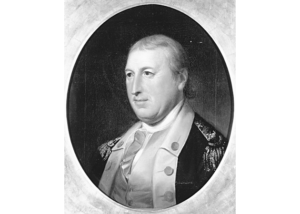The American Revolution was essentially over. British General Cornwallis had surrendered at Yorktown in October 1781. Yet George Washington still had to keep his army together until a peace treaty was concluded. That didn’t happen until 1783.
Many of his officers were angry with Congress. They hadn’t been paid for a long time and were contemplating open mutiny, even to the point of marching on Congress, guns in hand.
 They knew Washington wouldn’t approve their potential plans, so they turned to Gen. Horatio Gates, the supposed hero of Saratoga. He really wasn’t the hero (that honor actually belonged to Benedict Arnold, prior to his turning traitor), but public perception is sometimes everything.
They knew Washington wouldn’t approve their potential plans, so they turned to Gen. Horatio Gates, the supposed hero of Saratoga. He really wasn’t the hero (that honor actually belonged to Benedict Arnold, prior to his turning traitor), but public perception is sometimes everything.
Gates had humiliated himself at the Battle of Camden in South Carolina, not only losing the battle, but being in the forefront of the hasty retreat. Yet there were some who still clung to the false idea that he was a leader, so they looked to him to “lead” in this mutiny.
The army was encamped in Newburgh, New York, in March 1783, and that’s why this episode is called the Newburgh Conspiracy. The mutineers called a meeting to discuss how to proceed with their plans. Gates was in charge.
Then, unexpectedly, Washington appeared at this meeting. He knew what they were plotting, totally disapproved of the movement, and hoped to soothe their anger over how they had been treated.
Washington had not only led the army all those long years of the war, but he had carried on another “war,” so to speak, the entire time—trying to get Congress to follow through on promises made. He was in constant communication with the Congress and came into this meeting to let the officers know about the latest exchange with the political leaders.
Some have called what he did next “political theater,” but to me, it seems genuine enough. One account describes what happened this way:
With a sigh, he removed from his pocket a letter and announced it was from a member of Congress, and that he now wished to read it to them. He produced the letter, gazed upon it, manipulated it without speaking. What was wrong, some of the men wondered. Why did he delay?
Washington now reached into a pocket and brought out a pair of new reading glasses. Only those nearest to him knew he lately required them, and he had never worn them in public. Then he spoke: “Gentlemen, you will permit me to put on my spectacles, for I have not only grown gray but almost blind in the service of my country.”
This simple act and statement by their venerated commander, coupled with remembrances of battles and privations shared together with him, and their sense of shame at their present approach to the threshold of treason, was more effective than the most eloquent oratory.
As he read the letter, many were in tears from the recollections and emotions which flooded their memories. As Maj. Samuel Shaw, who was present, put it in his journal, “There was something so natural, so unaffected in this appeal as rendered it superior to the most studied oratory. It forced its way to the heart, and you might see sensibility moisten every eye.”
Finishing, Washington carefully and deliberately folded the letter, took off his glasses, and exited briskly from the hall.
Immediately, Henry Knox and others faithful to Washington offered resolutions affirming their appreciation for their commander in chief, and pledging their patriotism and loyalty to the Congress, deploring and regretting those threats and actions which had been uttered and suggested. What support Gates and his group may have enjoyed at the outset of the meeting now completely disintegrated, and the Newburgh Conspiracy collapsed.
I share this story for two reasons: first, I want to showcase again the character George Washington brought to his public duties; second, I want emphasize that history sometimes turns on the actions of one individual.
Let’s never forget that our actions do have consequences. By being obedient to what we know is right in God’s eyes, we can truly make a difference in this world.
